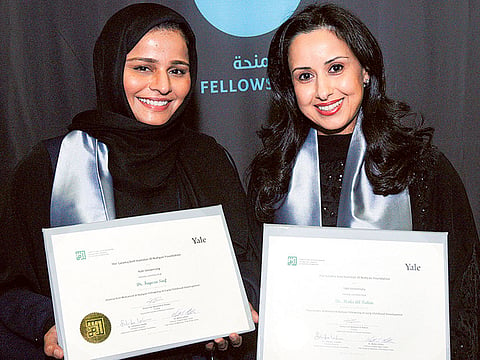Childhood development fellowship for 8 women
Projects undertaken as part of programme aim to encourage better reading habits, detect developmental delays and urge better disciplinary methods

Abu Dhabi: Eight women, mostly Emiratis, have completed a two-year fellowship designed to enhance childhood development practices in the UAE.
The Shamsa Bint Mohammad Al Nahyan Fellowship in Early Childhood Development is offered by the Salama Bint Hamdan Al Nahyan Foundation in collaboration with US-based Yale University’s Edward Zigler Centre in Child Development and Social Policy. It is designed to support the professional development of individuals who work with children in the UAE, including teachers, doctors, social workers and communication experts.
The eight women attended intensive seminars with experts and also toured paediatric hospitals and schools in the US. They were the first batch of professionals to be part of the programme. As reported by Gulf News in February, a second batch of 10 women has started the fellowship this year.
Shaikha Shamsa Bint Mohammad Al Nahyan, the fellowship’s patron, said the projects undertaken under the fellowship aim to encourage better reading habits among children, help parents detect developmental delays and urge better disciplinary methods. The eight women have demonstrated that they have the skills to create world-class programmes and services for UAE-based families, she added.
As part of her fellowship, Emirati Maha Al Fahim, decided to explore if mothers read to their children.
The family physician, who works at a primary health care clinic in Abu Dhabi, observed that many mothers were confused when asked if they read to their children.
“As part of a questionnaire for mothers who bring their children for routine vaccinations, we asked if their children point to books and pictures when being read to. Many seemed confused,” Maha said.
Maha’s findings revealed that only 25 per cent of the 350 women who had visited public clinics in the capital had started reading to their children before the age of six months.
“Cognitive development, social skills, literacy and parental bonding are all supported if caregivers read to their children from an early age onwards, and this is not happening as much as it should. Many parents only start reading when their children are a year old, and they’ve missed out on a crucial window of development until that age,” Maha told Gulf News. Only about half of the parents also fully understood the benefits of reading.
Maha who introduced a pilot programme to distribute books to parents who come in for vaccinations at Al Bateen Clinic, which is run by the Ambulatory Healthcare Services.
“I purchased 8,000 titles, 80 per cent of which are Arabic, and these will be given out over the next year. In addition, the medical staff will work to educate parents about the importance of reading. Fortunately, I have noticed that most parents will willingly and enthusiastically adopt positive behaviours for their children,” she said.
Fayeza Nasir, a consultant family physician and acting quality director at Ambulatory Healthcare Services, decided to help parents track children’s developmental milestones.
“Only if you know that your child has not started pointing or grasping things at the right time can you intervene if required. Unfortunately, I found that many parents who visit public health care facilities were unaware of these milestones,” she told Gulf News.
So they decided on an initiative that would give parents the necessary knowledge.
“From July onwards, all 37 primary health care facilities run by the AHS will distribute vaccination cards that contain information on the most important developmental milestones. We expect to hand out about 4,000 of these cards by the end of 2015 in a bid to promote greater awareness,” Fayeza said.
For example, a child must be able to point to things by 18 months of age, and should be able to pick up items with the thumb and index finger by nine months on average.
“Of course all children are different. But it is necessary to track these milestones and notify physicians if they don’t appear. It is only then that we can investigate whether further intervention is necessary to help children catch up with their peers,” Fayeza said.
Huda Al Dhanhani, a paediatrician at Tawam Hospital in Al Ain, decided to find out if the influence of nannies and housemaids, most of whom come from different cultural and linguistic backgrounds, affects children’s language skills.
As part of her fellowship, she developed a questionnaire to explore the issue.
“It was interesting to note that there is a near-similar proportion of children with language developmental delays in both groups: those raised primarily by external caregivers and those raised by family members. What this seems to indicate is that the quality of time and care the child gets is what determines language skills rather than who the caregiver is,” Huda said.
In essence, how well the caregiver communicates is important to help children develop language proficiency, as is the education level, Huda said.
Her study was able to obtain responses from the hospital’s outpatient clinic, but she hopes to extend its reach to at least 250 children to improve the reliability of the findings. For this, responses will be sought from parents who have enrolled children at nurseries.
“This is an ongoing project and I hope to disseminate the findings into actionable items once I have collected enough information,” Huda added.



